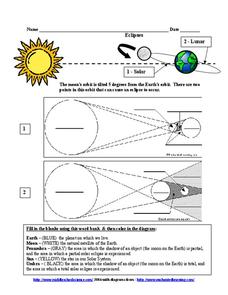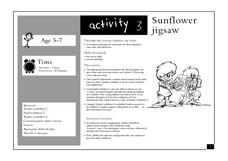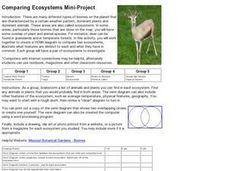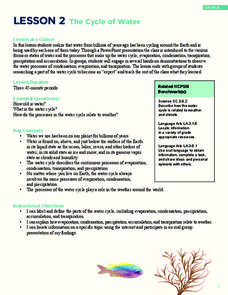Curated OER
Sky Watching
Students complete night-sky observations to understand how our knowledge of the sky has been enhanced by telescopes. Students complete a timeline worksheet giving the history of telescopes. Students then then make their own observations...
Alabama Learning Exchange
Scaling Down the Solar System
Learners work collaboratively to gain a better understanding of the vastness of space by scaling down the solar system. They measure by inches, gain an understanding of space, and model the distances of the planets from the sun.
Captain Planet Foundation
Energy Flow in the Garden
How can you tell what an owl has eaten? Study the food chain and flow of energy in an ecosystem by dissecting an owl pellet and noting the bones found inside. Additionally, the lesson includes a game about consumers and producers with a...
California Academy of Science
Kinesthetic Astronomy: Longer Days, Shorter Nights
A lamp, four globes, and some signs taped around the room are all you need to set up a solar system simulation for teaching how Earth's tilted axis creates the seasons. (Sticky dots are also needed, but not mentioned in the materials...
Curated OER
Nebular Theory-Origin of the Solar System
For this Nebular Theory worksheet, students are given diagrams of the stages that occurred in the formation of the solar system. They order the diagrams based on the occurrences of each event and answer twelve questions about the Nebular...
Curated OER
Eclipses
In this eclipses worksheet, students are given diagrams of a solar and lunar eclipse. They fill in each diagram with given terms and color the diagram to indicate the process for each type of eclipse.
Curated OER
Adopt A Constellation
In this space science worksheet, learners discover and write the name of their favorite constellation. Then they describe the history of it and draw a diagram, labeling the major stars and providing lines to show its shape.
Curated OER
Classification of Organisms
For this classification worksheet, students solve 3 classification riddles, complete 6 true and false questions, complete 4 sequences, and solve a riddle about the classification of an animal.
Curated OER
Is There Ice on Mercury?
In this ice on Mercury learning exercise, students read about the data collected from the NASA Messenger and the Arecibo Radio Telescope indicating the possibility of ice on Mercury. Students solve 6 problems including finding the scale...
Curated OER
Why do Stars Rise in the East?
For this stars rise in the east worksheet, students use geometry to show how the Earth rotates from west to east and why celestial bodies appear to rise in the east and set in the west. Students draw a figure and label given points in...
Curated OER
Star Circles
In this star circles worksheet, students solve six problems given a diagram of a time-exposure photograph of the stars. Students determine the scale of the image, the location of the North Celestial Pole, they identify Polaris and they...
Curated OER
Exploring Hurricanes
In this hurricane worksheet, students explore the behavior of hurricanes by reading an article about it. They complete 8 short answer questions that follow.
Curated OER
Sunflower Jigsaw
Students recognize and name the main parts of a flower. In this life science lesson, the teacher leads a discussion about the parts of a plant, then students color and cut out the parts of a planet, then glue the parts together...
Curated OER
The Atom
In this atom worksheet, students read about the parts of the atom and how atoms combine into molecules and compounds. Students learn how to read a periodic table. This worksheet has 20 fill in the blank and 10 matching questions.
Curated OER
Properties of Light
In this light spectrum worksheet, students will read a diagram and a chart listing information about the different types of light rays from Gamma rays to radio waves. Then students will write a short essay about a new life-form that...
Curated OER
The Water Cycle
In this water cycle worksheet, students read an informational passage, observe a labeled diagram of the transpiration water cycle, and answer comprehension questions. Students answer seven multiple choice questions and write a story from...
Curated OER
The Atom
In this atom worksheet, students read about the structure of the atom including its subatomic particles and John Dalton's theory of the atom. Students also read about the differences between atoms, molecules and compounds. They answer 30...
Curated OER
Time Zones
For this time zones worksheet, students are given a map of the Earth indicating the time zones, the prime meridian and the international date line. Students answer 5 questions about solar occurrences and determine when each would be seen...
Curated OER
Plate Tectonics
In this plate tectonics worksheet, 5th graders are given notes with diagrams showing Earth's layers, the tectonic plates, evidence of Pangaea, sea-floor spreading and the types of boundaries. Students answer 5 review questions about the...
Curated OER
How Tsunamis Form
In this earth science worksheet, learners read and study facts about tsunami and earthquakes to complete 8 short answer questions that follow.
Curated OER
Comparing Ecosystems
Students, in groups, research two biomes. They create a Venn diagram and include the characteristics of each biome, placing similar features in the overlapping area of the circles.
NOAA
The Cycle of Water
Young water cycle enthusiasts discover the water they have been using has been cycling around the earth for billions of years. Through presentations, learners will understand that water has three states and how these forms fit into the...
Curated OER
Jupiter and Io
In this Jupiter and Io worksheet, students use a diagram of the planet and its moon to find the dimension of the image, the width of the largest feature in the atmosphere of Jupiter, the width of the smallest feature in the atmosphere of...
Curated OER
Homework on Kepler's Laws of Planetary Motion
In this Kepler's Law worksheet, students answer questions given a diagram of the orbits of two planets about the sun. They use Kepler's Three Laws of Planetary Motion to answer the questions.

























